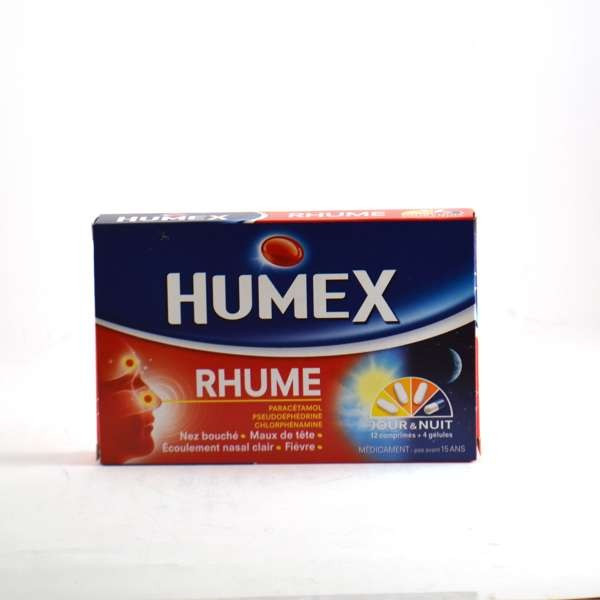Product Description Humex tablets contain paracetamol, an analgesic and antipyretic; and pseudoephedrine, a decongestant vasoconstrictor. Humex capsules, which should be taken in the evening, contain paracetamol and an antihistamine that dries up nasal discharges. This product can be used to ease nasal blockages and relieve headaches and fever associated with colds. How to Use Method of Administration Swallow tablets and capsules with a glass of water, leaving at least 4 hours between doses. If you suffer from severe kidney dysfunction, leave at least 8 hours between doses. Dosage For adults: take 1 tablet in the morning, and again, if necessary, at midday and with the evening meal; take 1 capsule at night before bed. Length of Treatment This medicine is not an anti-infective agent. If symptoms persist for more than 4 days, consult your doctor. Ingredients Paracetamol – 500 mg per tablet and capsule Pseudoephedrine hydrochloride – 60 mg per tablet Chlorphenamine maleate – 4 mg per capsule Active ingredients: Chlorphenamine maleate, paracetamol, pseudoephedrine hydrochloride Excipients: Pre-gelatinised wheat starch, microcrystalline cellulose, Croscarmellose na salt, erythrosine, gelatine, indigotin, magnesium stearate, povidone K30, colloidal silica, sodium laurilsulfate, talc, titanium dioxide Packaging Humex Cold: Tablet and Capsule: pack of 12 tablets (white) and 4 capsules (white and blue) Precautions for Use In susceptible persons, pseudoephedrine may provoke acute glaucoma, symptoms of which include bloodshot, sore and painful eyes with blurred vision. In such cases, an urgent consultation with an ophthalmologist is essential. Decongestant vasoconstrictors can increase heart rate (a condition known as tachycardia) and provoke palpitations and nausea. If these side effects are heavily pronounced, treatment must be discontinued. Rarely, these effects can also cause complications such as convulsions, hallucinations and unusual restlessness (particularly in cases of excessive dose). Do not exceed the recommended dose. If you have an over-active thyroid, heart disease, diabetes, mental disorder, kidney dysfunction or (if you are elderly, and particularly if you have chronic constipation) a tendency towards disorientation or drops in blood pressure, it is advisable to consult your doctor before taking this medicine. Do not use this medicine with other medicines containing paracetamol – such association creates a risk of excessive dose, which can be harmful to the liver. While taking this medicine, avoid alcohol – it increases your susceptibility to drowsiness. Contra-indications Do NOT use: – if you are susceptible to closed-angle glaucoma; – if you are susceptible to urinary blockages (e.g. due to benign enlargement of the prostate); – if you have liver dysfunction; – if you have high blood pressure for which you are not taking a specific treatment; – if you have severe coronary artery disease; – if you have a history of convulsions; – if you have a history of stroke; – with non-selective MAOI-type antidepressants, or within 15 days of taking one or more non-selective MAOI-type antidepressants; – with another decongestant vasoconstrictor or vasoconstrictor containing one or more of the following substances: bromocriptine, pergolide, lisuride, cabergoline, ergotamine or dihydroergotamine; – if you are under 15; or – if you are breast-feeding. Be aware also of the possible interactions between medicines. If you are pregnant or breast-feeding: If you are pregnant: The effect of this medicine on the body during pregnancy is not well understood. For your health, you are advised not to use this medicine while pregnant. If you are breast-feeding: This medicine passes into breast milk. You are strongly advised not to use this medicine while breast-feeding. If you drive or operate machinery: This medicine contains an antihistamine that can cause drowsiness, an effect that can be powerful in certain individuals and is aggravated by alcohol consumption and sedative use. Do not drive or operate machinery until you have taken a few doses of this medicine and ensured that your body can handle it. If you are a professional sportsperson: This medicine contains a substance (phenylephrine, pseudoephedrine or synephrine) that is classed as a stimulant and can show up on anti-doping test results. Argentine footballer Diego Maradona famously tested positive for pseudoephedrine during the 1994 FIFA World Cup. Advice Use this medicine as prescribed by your doctor. Do not exceed the stated dose, observe the recommended intervals between doses and avoid excessive dose. If your symptoms persist, consult your doctor. If you have any questions about this medicine, or require any advice, please do not hesitate to contact our medical team. Confidentiality assured. Discover the rest of the Humex range – for fighting sore throat, cold and allergies.


 100% secure payment, Customer Satisfaction
100% secure payment, Customer Satisfaction
 Order shipped within 24 hours from Monday to Friday*
Order shipped within 24 hours from Monday to Friday*



